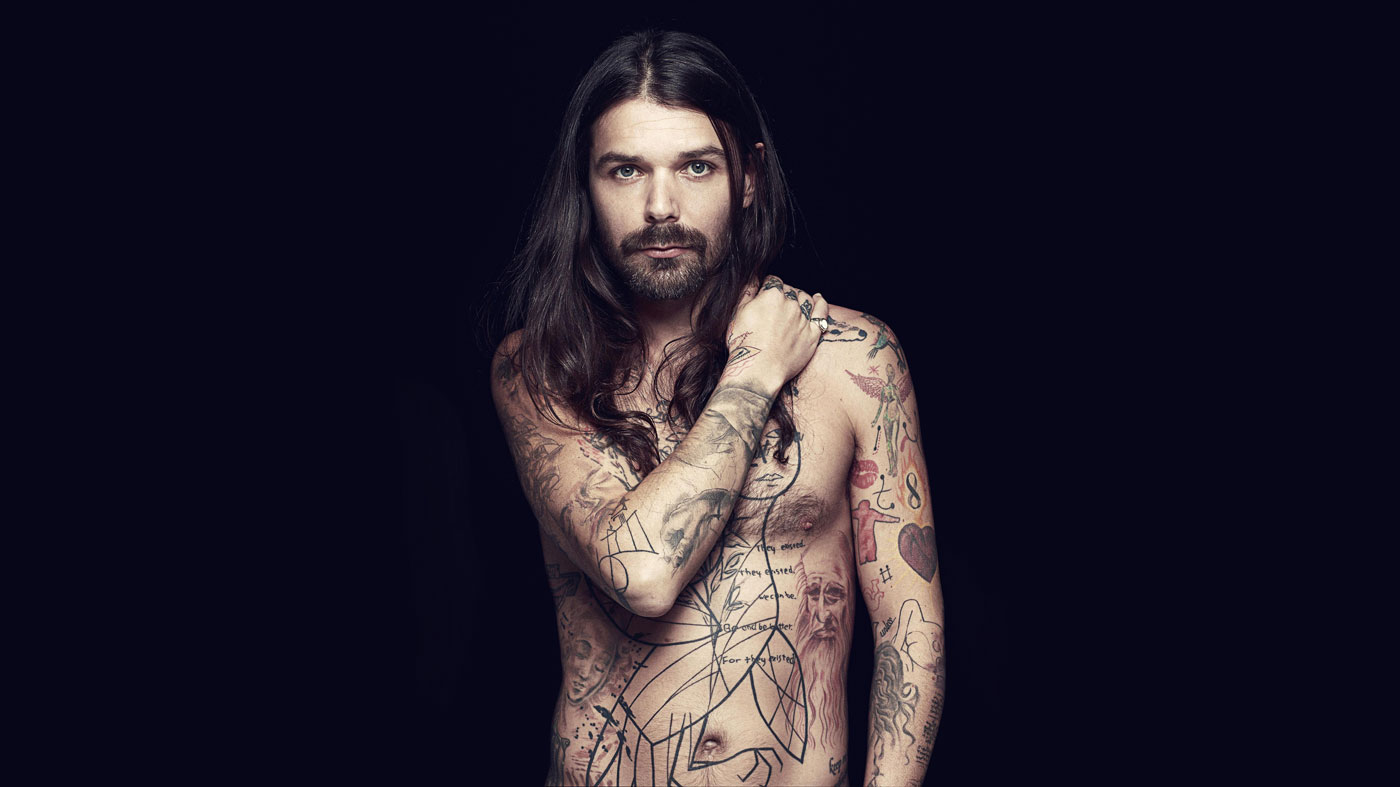Biffy Clyro's Simon Neil on new album Ellipsis and beating writer's block
"I don't think there's anything that can compete with a guitar"

Introduction
Biffy Clyro frontman Simon Neil has never settled for autopilot rock. Now, he shares his insight to keeping things creative, and lifts the lid on Ellipsis - a new album driven by his desire to “twist sounds” and “fuck with guitars”…
It’s ironic that Biffy Clyro’s most inventive album began with a creative drought. In 2015, Simon Neil was in a tailspin. He hadn’t written a song for 18 months. He hadn’t taken off his dressing gown for eight weeks.
I felt like I had nothing inside to say. No fuel left in the tank
“I felt like I had nothing inside to say,” reflects the frontman. “No fuel left in the tank. Writing 40 songs for Opposites [2013] was more work than I anticipated. I basically used up every idea I had.”
Drying up was a new experience for Simon. Since Biffy Clyro burst out of Kilmarnock in the post-millennium, the 36-year-old’s muse had rarely misfired, spitting out a stream of alt-rock classics that could be as heavy as Saturday Superhouse, as heartfelt as Many Of Horror, as bonkers as The Captain.
“I’ve always felt inspired,” he nods. “But I just couldn’t inhabit the same part of my brain. And I started to get into this panic mode, that maybe I’d never write a good song ever again. It wasn’t until I went to California that the album started to take shape in my mind.”
So began Ellipsis: a seventh album whose fearless fusion of leftfield riffage, antiquated synths and electro beats doesn’t so much push the envelope as punt it skywards. “At points it was disconcerting,” admits Simon, as he prepares to share his creativity-boosting tips. “But now we’ve finished, I can say it was a really successful experiment.”
Don't Miss
Biffy Clyro's Simon Neil talks guitars, writing riffs and new album, Opposites

Quit Your Comfort Zone
“I had to kinda break out of Scotland. I’ve only ever written Biffy songs in Scotland, and it’s ironic that this time I had to leave to open the floodgates. I couldn’t remove myself from the thought of writing the next Biffy record, and I needed to fall in love with writing music again.
It was more like, ‘This song had better be so f***ing good that nobody even notices there are drum machines on it.’”
“So I went away to California, wrote a bunch of tunes with friends, recorded at some studios - just to have fun and not put pressure on writing music. That’s when I started writing a few songs, and I thought, ‘You know what? I really think these are special.’ And thankfully, once that happened, it was all reasonably plain sailing.”
Move On
Clinging to your back catalogue spells creative death
“It would have been a lot easier to make another version of Opposites, but we would rather make a new record with a different sound - and for people to think it’s terrible - than do an approximation of what we’ve done previously. God bless AC/DC - I love them - but we didn’t want to be that kind of band. So the pressure I felt this time around was more like, ‘This song had better be so fucking good that nobody even notices there are drum machines on it.’”

Practice Doesn't Make Perfect
“I guess the main thing we did was not overwork the songs in the practice room. Half the songs on this record, we didn’t even play together until we went to the studio, and that gave us a different headspace.
A Strat is my sound, that’s my guitar. But on record, it’s nice to mess with that
“It was easy in the run-up to think, ‘Oh yeah, it’ll be fine’. But as soon as we got into the studio, we were like, ‘Wait a minute, have we made a huge mistake here?’ Week one, it seemed like the worst idea. It took a lot of faith in the vision we had for the album. I’m really glad we stuck to our guns, because we’ve ended up with a record that’s different in ways we couldn’t have predicted.”
Choose Inspiring Axes
You don’t need the world’s biggest gigbag
“This time, rather than trying tons of different guitars, we found a few that we loved the tone of, then we’d go to town on pedals and amplifiers, and really take our time to find a sound we hadn’t heard before.
“I used Mosrite guitars for the first time. I was playing a late-90s one, and it just had real attack and character: that was one of the main sounds on songs like Wolves Of Winter. Obviously, there were my regular Stratocasters, and I finally bought myself a Les Paul. I got a 1977 Randy Rhoads special edition: it’s just a delicious Les Paul and brings something else to the table. A Strat is my sound, that’s my guitar. But on record, it’s nice to mess with that. Y’know, some songs need thick walls of guitar, others need something a bit more wiry.”

Put Your Foot Down
“With Garth Richardson [former producer], we’d put some beautiful old guitars through some gorgeous amps. On this record, we basically plugged the guitar into anything. For years, I’ve loved traditional distorted guitars. I thought that’s all I would ever do. But on this record, I fell in love with textures, delays, flanges.
I love distorted guitars. I thought that’s all I would ever do. But on this record, I fell in love with textures, delays, flanges
“We’d spend a few days working on specific guitar sounds, putting them through effects like the Boss DD-6, the Magic Death Eye - which made everything sound like a nuclear bomb - or Mike Vennart’s signature Infatuator pedal - which is on Wolves Of Winter - and this amazing Burns distortion pedal. Then I’d record that sound into a Kemper, then mess that up even more.
“It’s a case of messing around. I don’t want to work out how these things work. I just want to get on it, make a sound and go, ‘Yeah, that sounds fucking awesome’. At the same time, the big distortion sound on this record is me plugged straight into really small combos. My main guitar sound was two tiny 1967 Peavey tweed combos, side-by-side.”
Try Weird Shit
Especially if your producer has a whole studio full of it
“Rich Costey [producer] is an absolute tech junkie. We’d sometimes plug the guitar through this mad old Russian synthesiser: this thing honestly looked like it was made in fucking 1981, and its name was unpronounceable.
“Rich’s engineers would even make little mini-keyboards, just from bits and pieces lying around the studio. I used an amplifier by Black Volt: again, it’s a tiny wee combo, and very home-made and battered-together, but it has this really gloopy, bluesy tone.
“We used a Fairlight, which is this old [sampler/synth] that Peter Gabriel used in the 80s. Each sound takes about 90 seconds to load up, so it’d be long days waiting to find out what the next fucking sound was like. But being on bits of old kit like that, it just puts you in a different headspace. I’ve kinda fallen in love with sounds that are a bit wonky.”

Electronics Are Your Friend
“On previous albums, we wanted to capture the essence of our band live. On this one, we didn’t want it to necessarily feel like Biffy live, and we weren’t afraid to use drum machines or twist the sounds on the computer. We used Mellotrons, pianos, old Korg stuff, the Roland Juno synth. I was putting trap beats on every song… until everyone else told me to fucking stop!
We deliberately started by keeping the guitars minimal, trying to make the songs heavier with different techniques
“You’re not always even in control, but you end with a sound that you just couldn’t achieve otherwise. Sometimes, you can make a song with keyboards that feels heavier than a song with a seven-string guitar. But if any of the songs felt like they were going too far into electronic, we would pull it back in. Because we want to be a rock band.
“We just want to do things in a slightly odd way for the next couple of records. Really fucking with the sound, y’know, and not letting our egos get in the way. Just so we never resorted to our old habits.”
Less Is More
The song will tell you what it needs
“With Garth, we were aiming to make records that sounded as good as AC/DC or Led Zeppelin. We’d stack guitars and really go for songs tell us what to do. So rather than us playing our parts and ticking the boxes, we’d ask, ‘What does this song need? And if it doesn’t need another five guitars, let’s not put them on there’.
“I didn’t just want to go into my default mode of stacking guitars, getting the baritone in there, then a wall of fuzz and a Stratocaster up top. We deliberately started by keeping the guitars minimal, trying to make the songs heavier with different techniques.
“So rather than have another guitar doubling the sound, we’d approximate a sound on the synth, or I’d sing along with the guitar through a distorted mic. Some of the songs only have one guitar track. And I feel like I would have been too afraid to do that previously.”

Keep Them Guessing
“On Flammable, there’s this wee instrumental break near the end. We recorded a dozen 12-string guitars and two Mosrites playing the same riff - and it ended up sounding not even like a guitar. It sounds like a synthesiser. And at the start of Flammable, there’s that really crystal-clear guitar sound with the wah pedal.
Rich produced an incredible Danish band called Mew. Some of their songs are so heavy, yet they’ve got this guitar tone that’s clear as glass
“Part of the reason we wanted to work with Rich is because he’s produced an incredible Danish band called Mew. Some of their songs are so heavy, yet they’ve got this guitar tone that’s clear as glass, almost no distortion on it.
“We really wanted to embrace making things heavy, but not necessarily distorted. So that was the main thing I’ve learned on this record: you don’t need to put a Big Muff on everything to make it sound angry.”
Cast Your Net Wider
Listen to inventive bands - they’ll rub off
“We are always gonna be a rock band. Our education of Nirvana, Guns N’ Roses, Fugazi, Shudder To Think - that’s the bedrock of everything we do. But in the last five years, we’ve taken a lot more influence from hip-hop and even bands like Tears For Fears: stuff I’d never have listened to when I was younger.
“It all piles on top of our rock influences. I feel like I’ve been guilty of aspiring to make Back In Black and Appetite For Destruction. I’ve sometimes been too much in awe of those records. I think the guitar can be used in such a different way. Y’know, like with Tom Morello. I’d never seen a guitar played like that.”

Go With Your Gut
“Growing up, I thought I’d never play a guitar solo. Y’know, I’m not a great shredder. I’ve always felt confident writing songs and playing weird chords, but when it comes to doing something flash, I’ve always been scared of that. That’s why I relished playing a solo on Wolves Of Winter. With that song, we did a demo in my house.
You could have 10 people playing the same guitar set-up, and they would all sound different
“The boys arrived at lunchtime, and I came down in my dressing gown - and tried to do this solo. I hadn’t thought about it. I just went straight into this solo - and it came out in a one-er. It felt so natural I didn’t question it. If I’d pondered the solo for longer, it would have ended up awful, or I’d have got scared and removed it. But it felt like part of the journey of that song. I do think there’s a place in the world for guitar solos - just not for the sake of wanking off.”
Choose The Guitar
Because no other instrument is so creative
“There’s always new ways to apply the guitar. Y’know, guitar, bass and drums maybe doesn’t feel quite as exciting as it used to, but I’ll tell you what - guitars are always gonna be around. I love nothing more than seeing someone standing on a stage and expressing themselves with a guitar.
“You could have 10 people playing the same guitar set-up, and they would all sound different. I don’t think there’s a lot of instruments that you can say that about. It’s a very emotive instrument, the guitar.
“I truly believe it to be more emotive than a violin or piano or anything else. I don’t think there’s anything at all that can compete with a guitar - and it certainly ain’t gonna be laptops and drum machines. There’s a feel to the guitar that cannot be replaced.”
Ellipsis is out now on 14th Floor Records
Don't Miss
Biffy Clyro's Simon Neil talks guitars, writing riffs and new album, Opposites

